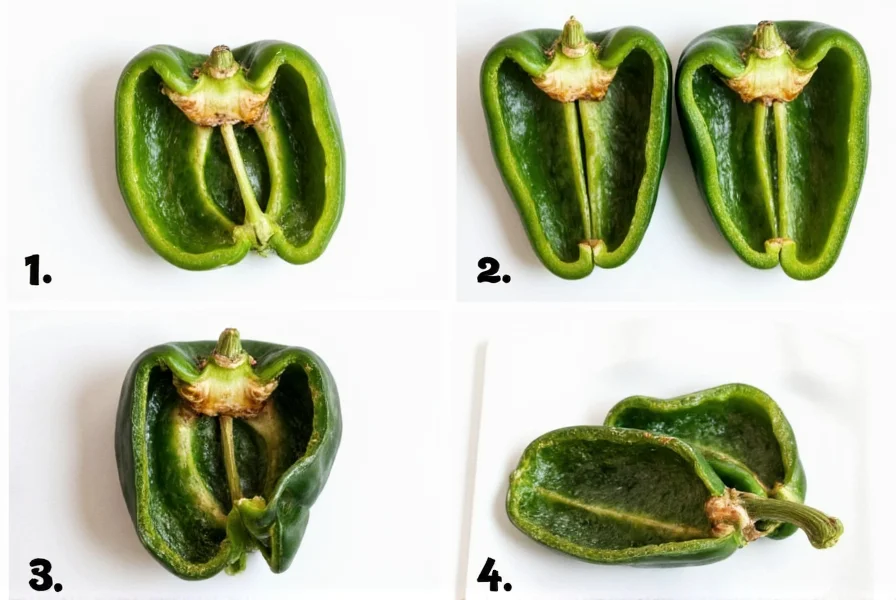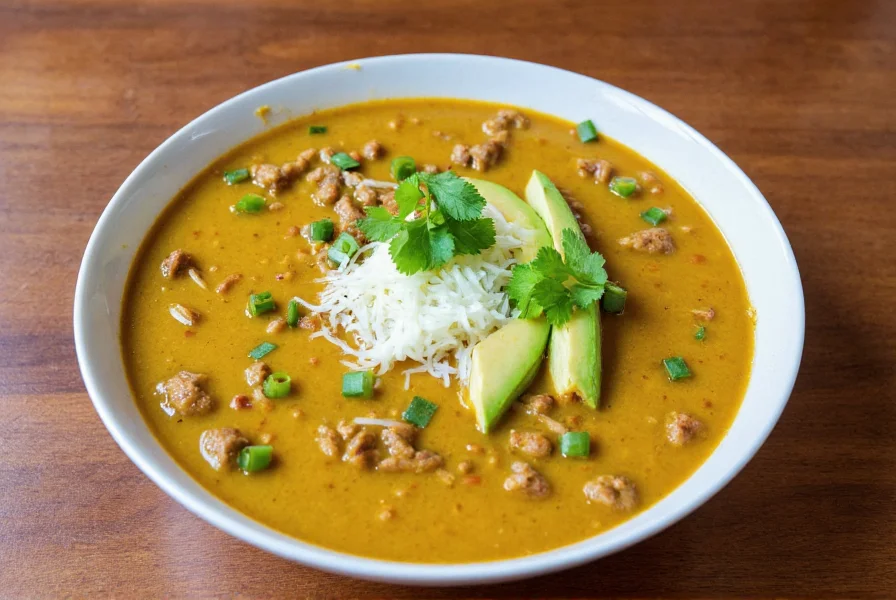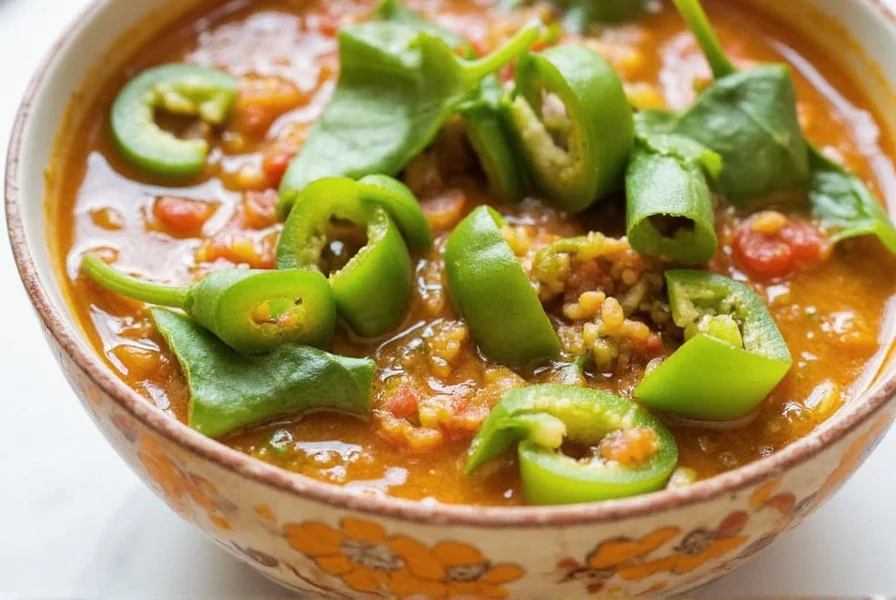Poblano peppers, native to Mexico and central America, transform dramatically when roasted. Their thick, dark green skin blackens and blisters, revealing a sweet, smoky flavor beneath. This culinary technique is essential for authentic poblano pepper soup, as raw poblanos have a grassy taste that doesn't fully develop the soup's characteristic depth.
The History and Cultural Significance
Originating in Puebla, Mexico (where the pepper gets its name), poblano peppers have been cultivated for over 500 years. While not traditionally made as a standalone soup in Mexican cuisine, modern interpretations have elevated roasted poblano soup to a beloved dish across North America. Chefs often credit California's fusion cuisine movement of the 1980s with popularizing this creamy preparation.
Understanding Poblano Peppers
Before making soup, understanding your main ingredient is crucial. Poblanos are often confused with similar peppers, but have distinct characteristics:
| Pepper Type | Heat Level (Scoville) | Flavor Profile | Best For Soup? |
|---|---|---|---|
| Poblano | 2,000-4,000 | Earthy, mild, slightly sweet | ✓ Ideal |
| Anaheim | 500-2,500 | Milder, less complex | ✓ Acceptable substitute |
| Jalapeño | 2,500-8,000 | Sharp, grassy, hotter | ✗ Only for heat lovers |
Essential Preparation Techniques
The secret to exceptional poblano pepper soup lies in proper pepper preparation. Roasting transforms the flavor profile completely:
- Char the skin: Place whole peppers directly over gas flame, under broiler, or on grill, turning frequently until skin blackens (8-12 minutes)
- Steam in a bag: Transfer to paper or plastic bag for 10-15 minutes to loosen skin
- Peel carefully: Remove skin under running water, keeping seeds if you prefer more heat
- Seed strategically: For mild soup, remove all seeds and membranes; for medium heat, keep some seeds
Skipping the roasting step results in a grassy, one-dimensional flavor that lacks the complexity characteristic of authentic poblano pepper soup.

Classic Poblano Pepper Soup Recipe
This authentic poblano pepper soup recipe serves 4-6 and takes approximately 45 minutes from start to finish. The recipe balances traditional techniques with accessible ingredients.
Ingredients
- 6 large poblano peppers (about 1.5 lbs)
- 1 large white onion, chopped
- 3 garlic cloves, minced
- 2 tbsp olive oil
- 4 cups vegetable or chicken broth
- 1 cup heavy cream or coconut milk (for dairy-free)
- 1 tsp cumin
- Salt to taste
- Lime wedges for serving
Step-by-Step Instructions
- Roast and peel poblano peppers using the technique described above
- In a large pot, sauté onions in olive oil until translucent (5-7 minutes)
- Add garlic and cumin, cooking for 1 minute until fragrant
- Add roasted poblanos and broth, bring to simmer for 20 minutes
- Carefully blend soup until smooth using immersion blender
- Stir in cream or coconut milk, heat through without boiling
- Season with salt and serve with lime wedges
Variations for Different Dietary Needs
Authentic poblano pepper soup can be adapted to various dietary preferences while maintaining its distinctive flavor:
- Vegan version: Substitute heavy cream with full-fat coconut milk and use vegetable broth
- Lighter version: Replace cream with Greek yogurt or cashew cream for reduced calories
- Smoky variation: Add 1/2 tsp chipotle powder or one chipotle in adobo sauce
- Protein boost: Stir in shredded chicken or black beans after blending
Common Challenges and Solutions
Even experienced cooks encounter issues with poblano pepper soup. Here's how to address them:
- Too spicy: Add more cream or a small amount of sugar to balance heat. Dairy proteins bind to capsaicin, reducing perceived spiciness.
- Too thin: Simmer uncovered for 5-10 minutes to reduce, or add a slurry of 1 tbsp cornstarch mixed with 2 tbsp cold water.
- Bitter taste: Over-roasted peppers can become bitter. Add 1/2 tsp honey or a splash of cream to counteract bitterness.
- Separation: If using dairy, avoid boiling after adding cream. For coconut milk versions, blend while hot for better emulsion.
Serving Suggestions and Pairings
Poblano pepper soup shines when paired thoughtfully. Traditional accompaniments include:
- Warm corn tortillas or crusty bread for dipping
- Avocado slices or guacamole for creaminess
- Queso fresco or cotija cheese for salty contrast
- Fresh cilantro and lime wedges for brightness
- A simple green salad with citrus vinaigrette
For beverage pairings, consider a crisp Mexican lager, a dry Riesling, or a non-alcoholic agua fresca. The soup's mild heat complements beverages with slight sweetness that can counterbalance the spiciness.

Storage and Reheating Tips
Proper storage maintains flavor and texture for future enjoyment:
- Refrigeration: Store in airtight container for up to 4 days
- Freezing: Freeze without dairy for up to 3 months; add cream when reheating
- Reheating: Warm gently over medium-low heat, stirring frequently
- Revitalizing: Add a splash of broth if soup has thickened too much
Flavor actually improves after 24 hours as the ingredients meld together, making poblano pepper soup an excellent make-ahead dish for entertaining.
Frequently Asked Questions
Can I make poblano pepper soup without roasting the peppers?
While possible, skipping the roasting step significantly impacts flavor. Unroasted poblanos have a grassy, one-dimensional taste. Roasting develops complex smoky-sweet notes essential to authentic poblano pepper soup. If short on time, broil peppers for 5 minutes per side as a quicker alternative to open-flame roasting.
How can I reduce the heat level in poblano pepper soup?
To make mild poblano pepper soup, remove all seeds and white membranes (where most capsaicin resides). For additional heat reduction, add 1/4 cup heavy cream or coconut milk per serving. Dairy proteins bind to capsaicin, the compound responsible for heat, effectively reducing perceived spiciness without diluting flavor.
What's the best way to store roasted poblano peppers for soup?
Store roasted poblano peppers in an airtight container with a damp paper towel in the refrigerator for up to 5 days. For longer storage, freeze peeled peppers in a single layer on a baking sheet, then transfer to freezer bags for up to 6 months. Properly stored roasted poblanos maintain flavor and texture for future soup preparation.
Can I use canned roasted poblano peppers for soup?
Yes, but fresh roasted peppers provide superior flavor. If using canned, drain thoroughly and rinse to remove preservatives. Expect a slightly different texture and less complex flavor profile. For best results with canned peppers, add 1/4 tsp smoked paprika to compensate for lost roasting flavors when making poblano pepper soup.
How do I prevent my poblano pepper soup from turning brown?
Browning occurs due to oxidation. To maintain vibrant green color in poblano pepper soup, add acid (1-2 tbsp lime juice) immediately after blending. Serve promptly or cover surface directly with plastic wrap to limit air exposure. Avoid overcooking, as prolonged heat also causes color degradation in green vegetable-based soups.











 浙公网安备
33010002000092号
浙公网安备
33010002000092号 浙B2-20120091-4
浙B2-20120091-4